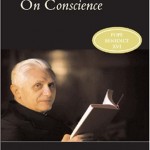
The press loves its “Rottweiler narrative” on Benedict, but he has confounded them on it, over and over again. Sooner or later they will realize he was never the hammer they claimed he was. He has always been extremely pastoral; wedded to the truth while aware of human complexities. And here he is, proving it again:
As a book launch it is certainly bound to move some product, but expect the usual clarifications that always appear about 4 days after the press has blared a headline as subtle as a trumpet:
Pope Benedict XVI says that condom use is acceptable “in certain cases”, notably “to reduce the risk of infection” with HIV, in a book due out Tuesday, apparently softening his once hardline stance.
In a series of interviews published in his native German, the 83-year-old Benedict is asked whether “the Catholic Church is not fundamentally against the use of condoms. “It of course does not see it as a real and moral solution,” the pope replies. “In certain cases, where the intention is to reduce the risk of infection, it can nevertheless be a first step on the way to another, more humane sexuality,” said the head of the world’s 1.1 billion Catholics.
The new volume, entitled Light of the World: The Pope, The Church and The Signs Of The Times, is based on 20 hours of interviews conducted by German journalist Peter Seewald.
I emailed a writer who has read the book (which I also talk about in the post below) and got this text in response:
Yes he does say that but it is a bit more nuanced in context. A bit. Basically he is not saying that [Catholic] institutions should give out but if an individual uses it might be a sign of moral awareness.
This writer promises greater exposition later, so I look forward to reading it, and of course to reading the book.
So, to clarify, he’s not endorsing condoms. He’s saying that it could be the first step of a particular individual to realize that their action is wrong. His example of a male prostitute is very particular. The Church doesn’t believe that male prostitution is a good thing; so it’s not going to endorse anything that would facilitate the behavior even if it’s ostensibly with the good intention of protecting one’s self or another. That good intention doesn’t change the nature of the behavior itself.
Yes, read the whole thing, especially if you’re feeling “confused” or “disturbed” or slightly hysterical about this story.
Deacon Greg says “Don’t be surprised if the Vatican begins “clarifying” these remarks soon. . . and here comes some:
Cardinal Elio Sgreccia, the Vatican’s long-time top official on bioethics and sexuality, elaborated on the pontiff’s comments, stressing that it was imperative to “make certain that this is the only way to save a life”. Cardinal Sgreccia said the condom question was one that “needed an answer for a long time,” adding: “If Benedict XVI raised the question of exceptions, this exception must be accepted… and it must be verified that this is the only way to save life. This must be demonstrated.”
Damian Thompson: I am praying that this report is true, because the argument it attributes to the Pope is thoroughly humane and reasonable – and does not contradict the Church’s teaching against artificial birth control.
More here
No one can say this 83 year-old pope rests on his laurels. Aside from his travels (England, Sicily, Spain, just in the last months) there has also been this, then the enormous Verbum Domini, and oh, yeah, the new Cardinals.
A tireless worker in the fields of the Lord.
UPDATE:
An excerpt from Chapter 11 of Light of the WorldLight of the World: from Catholic Word Report:
As a matter of fact, you know, people can get condoms when they want them anyway. But this just goes to
show that condoms alone do not resolve the question itself. More needs to happen. Meanwhile, the secular realm itself has developed the so-called ABC Theory: Abstinence-Be Faithful-Condom, where the condom is
understood only as a last resort, when the other two points fail to work. This means that the sheer fixation on the condom implies a banalization of sexuality, which, after all, is precisely the dangerous source of the attitude of no longer seeing sexuality as the expression of love, but only a sort of drug that people administer to themselves. This is why the fight against the banalization of sexuality is also a part of the struggle to ensure that sexuality is treated as a positive value and to enable it to have a positive effect on the whole of man’s being.There may be a basis in the case of some individuals, as perhaps when a male prostitute uses a condom, where this can be a first step in the direction of a moralization, a first assumption of responsibility, on the way toward recovering an awareness that not everything is allowed and that one cannot do whatever one wants. But it is not really the way to deal with the evil of HIV infection. That can really lie only in a humanization of sexuality.
Are you saying, then, that the Catholic Church is actually not opposed in principle to the use of condoms?
She of course does not regard it as a real or moral solution, but, in this or that case, there can be nonetheless, in the intention of reducing the risk of infection, a first step in a movement toward a different way, a more human way, of living sexuality.
Janet E. Smith provides some analysis:
We must note that the example that Pope Benedict gives for the use of a condom is a male prostitute; thus, it is reasonable to assume that he is referring to a male prostitute engaged in homosexual acts. The Holy Father is simply observing that for some homosexual prostitutes the use of a condom may indicate an awakening of a moral sense; an awakening that sexual pleasure is not the highest value, but that we must take care that we harm no one with our choices. He is not speaking to the morality of the use of a condom, but to something that may be true about the psychological state of those who use them. If such individuals are using condoms to avoid harming another, they may eventually realize that sexual acts between members of the same sex are inherently harmful since they are not in accord with human nature. The Holy Father does not in any way think the use of condoms is a part of the solution to reducing the risk of AIDs. As he explicitly states, the true solution involves “humanizing sexuality.”
Anyone having sex that threatens to transmit HIV needs to grow in moral discernment. This is why Benedict focused on a “first step” in moral growth. The Church is always going to be focused on moving people away from immoral acts towards love of Jesus, virtue, and holiness. We can say that the Holy Father clearly did not want to make a point about condoms, but wants to talk about growth in a moral sense, which should be a growth towards Jesus.
It’s too long to excerpt, but read it all.
UPDATE II:
Lisa Graas::
As long as you have an ounce of moral responsibility in you, there is hope that you can “re-develop your understanding”. “Re-developing” your understanding means coming to a more Christian perspective on things. Common sense should tell you that someone who is HIV-positive who goes around intentionally infecting others with HIV is more evil than someone who would say no to that. The Pope was using the extreme example of a prostitute to explain just such a difference.
Does this mean that the Pope is going to approve of the use of condom distribution to prevent AIDS? Nope. His very next statement shows where he is on that.
“But it is not the proper way to deal with the horror of HIV infection.”
The Catholic track record in Africa on this issue is better than the non-Catholic track record.
Read it all for more on that
Catholic Herald UK talks to John Thavis of CNS and John Allen of NCR:
Thavis: “These are nuanced comments, and one should read the passage in full to gauge the Pope’s position. The Pope’s answer seems to invite follow-up questions. Meanwhile, it’s worth noting that the Vatican has never proclaimed a ‘ban’ on condom use in Aids prevention; on the contrary, some Vatican theologians and officials have argued that for married couples in which one partner is HIV-infected, use of condoms would be a moral responsibility.”
Allen: “Pope Benedict XVI has signaled that in some limited cases, where the intent is to prevent the transmission of disease rather than to prevent pregnancy, the use of condoms might be morally justified. While that position is hardly new, in the sense that a large number of Catholic theologians and even a special Vatican commission requested by Benedict XVI have endorsed it, this is the first time the Pope himself has publicly espoused such a view.
UPDATE III:
At dotcommonweal: “a great step forward, literally life-saving.”
That, of course, is debatable. Further context and more examination will be forthcoming, of course but is anyone really making the argument that people indulging in casual or promiscuous sex were nevertheless so concerned about a church stricture that they went without condoms, because of it? I doubt it. If you’re not listening to a commandment from God, you’re probably not listening to a teaching from the church, either. That’s a whole lifetime of sinning, speaking, here! :-)
I don’t think Benedict has so much “changed courses” but simply chosen one example to articulate an idea that is a whole lot deeper than, “maybe condoms aren’t so bad.”
Fr. Joseph Fessio: in the NY Times:
The Rev. Joseph Fessio, a former student of Benedict and the editor in chief of Ignatius Press . . .“It’s very carefully qualified,” he said. “It would be wrong to say, ‘Pope Approves Condoms.’ He’s saying it’s immoral but in an individual case the use of a condom could be an awakening to someone that he’s got to be more conscious of his actions.”
More from Jimmy Akin:
Among the disservices L’Osservatore Romano performed by breaking the book’s embargo in the way it did was the fact that it only published a small part of the section in which Pope Benedict discussed condoms. As a result, the reader could not see the context of his remarks, giving the reader no way to see the context and guaranteeing that the secular press would take the Pope’s remarks out of context (which they would have anyway, but perhaps not this much). Especially egregious is the fact that L’Osservatore Romano omits material in which Benedict clarified his statement on condoms in a follow-up question.
So L’Osservatore Romano has performed a great disservice to both the Catholic and non-Catholic communities.
Many thanks to The Catholic World Report for providing the entire context of the Pope’s words, which are part of a discussion on his remarks about condoms and AIDS prevention during his visit to Africa last March.
Chelsea also links to this WaPo piece from March of 2009: The Pope May Be Right
Advocating “right sexuality” not condom use
FINAL UPDATE: Press office of the Holy See issues a succinct clarification:
The head of the Holy See Press Office, Father Federico Lombardi, SJ, has issued a statement clarifying passages of the book Light of the World, in which Pope Benedict discusses AIDS and condom use.
The statement says Pope Benedict states that AIDs cannot be solved only by the distribution of condoms, and, in fact, concentrating on condoms just trivializes sexuality, which loses its meaning as an expression of love and becomes like a drug.
At the same time, the Pope considered an exceptional situation in which the exercise of sexuality represents a real risk to the lives of others. In this case, the Pope does not morally justify the exercise of disordered sexuality, but believes that the use of condoms to reduce the risk of infection is a “first step on the road to a more human sexuality”, rather than not to use it and risking the lives of others.
Father Lombardi’s statement clarifies Pope Benedict XVI has not reformed or changed the Church’s teaching, but by putting it in perspective reaffirms the value and dignity of human sexuality as an expression of love and responsibility.
Related: John Allen breaks down a meeting between Vatican insiders and the mainstream press











